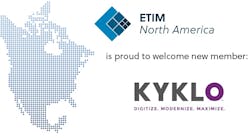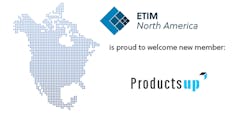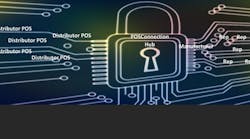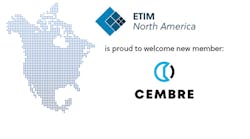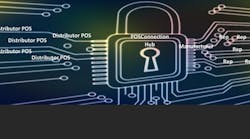Faster data at a flat monthly rate. What began as a technoid fantasy is now an industrywide service in the making.
After a gut-check of its membership came back positive last month, the board of directors of the Industry Data Exchange Association (IDEA), Rosslyn, Va., decided to press forward with the creation of an extranet for its members. The electrical extranet is designed to give users secure, high-speed access to the product and pricing data to be housed in IDEA's industry data warehouse (IDW) as well as a flat-rate conduit for sending and receiving transaction data and other communications worldwide. Some in the industry believe the extranet may do more than even the eagerly anticipated IDW to slash transaction costs. Certainly the combined package is a powerful concept.
"The hugely strategic thing with the (IDEA extranet) is that the IDEA board was able to negotiate a private extranet that will handle EDI transmissions at a flat rate, and it's the first time, we understand from MCI WorldCom, that this has ever been done in the world," Crum said. "Previously all EDI transactions had been metered, and you've been billed by VANs (value-added network providers) based on the amount of information you push through in the transmission. As EDI activities increase in our industry, which they are at an exponential rate, so too are the VAN charges through the industry. So it's a huge tax on the commerce of the electrical industry, and since we've been able to do this at a flat rate, we can push all the EDI through for the rates indicated. It's a huge advantage."
The IDEA board in mid-May approved the resumption of negotiations with MCI WorldCom, Jackson, Miss., to work out the final details of creating, maintaining, marketing and financing the extranet. A deal had just been finalized as this issue went to press, and IDEA officials were expecting the contracts to be signed during the first week of this month. The three-year commitment calls for IDEA to make an initial capital investment for construction of the network and then to pay a monthly service fee thereafter. With the negotiations done, IDEA expects to have the extranet in place when the IDW comes online sometime around the end of July.
The extranet will be a secure, private communications network built by MCI WorldCom. It will use frame relay and internet protocol (IP) communication standards but will not be accessible from the worldwide Internet. Access will be available only to members of IDEA, and critical business transaction traffic will be given automatic priority status, which insures that service will, in theory, be much more resistent to interruptions than a connection over the Internet itself.
In its original configuration, the extranet will be able to transfer all of any member's inter-company business transactions and graphical information. That includes sending and receiving transaction sets to download data from the IDW, and it explicitly includes all electronic data interchange (EDI) transactions with any trading partners, now and in the future. According to an IDEA information bulletin the extranet's initial construction will not be designed for data connections within a company or for sending and receiving audio and video signals, though those capabilities may be added in the future.
The main benefits of the extranet are three: speed, security and cost control. The extranet will allow users to send data over high-capacity T-1 trunk lines at speeds up to 1.544 megabits per second (Mbps). The security protocols used will offer "near banking grade security" says IDEA.
Users of the extranet will connect for fixed monthly fees with no additional usage charges. That means as users' appetite for data grows, which IDEA expects it will, especially once they get a feel for what they can do with the amount of data available from the IDW, they can retrieve and use that data without paying a VAN additional fees for the added traffic.
Financing for the system is substantial. In addition to their IDEA initiation fees, distributors will pay a monthly usage fee based on a formula that considers the distributor's total revenues and the number of branches he has. That usage fee covers access to the IDW and use of the extranet. In addition, the distributor will have to pay a monthly fee of $850 to $2,900 to MCI WorldCom to cover connection to the extranet and rental of an extranet router that will be installed on the distributor's site. Manufacturers don't pay a monthly usage fee to IDEA but instead, in addition to their IDEA initiation fee, they pay an annual fee that goes to maintenance of the IDW and operation of the IDEA. If they use the extranet the manufacturers also pay an initiation fee for the extranet that equals half their initiation fee to join IDEA. Manufacturers also pay the $850 to $2,900 fee to MCI WorldCom for connection and rental of the extranet router.
The bulk of the hardware for operating the extranet will be housed at MCI WorldCom's Network Management Center facilities in North Carolina. Distributors' and manufacturers' trading partners that are not members of IDEA will gain access to the extranet for EDI transactions via an MCI VAN center.
IDEA is understandably enthusiastic about the cost-saving prospects for its new services. An information bulletin put out by the association points out that members paying more than $850 per month in VAN fees will see an immediate cost savings because all current VAN traffic can be switched to the extranet. "These savings will grow over time as EDI and data communications usage escalate, while the extranet fees remain constant. Compared to current practices, industry wide savings associated with using the extranet are expected to exceed $2 million dollars per month" (italics in original).
For a distributor such as Van Meter Industrial, Cedar Rapids, Iowa, that spends $1,800 a month on EDI today, having a 56kbps connection at $850 a month is a "no brainer," but Dave Cahill, the company's vice president of information technology, says Van Meter "hasn't even scratched the surface yet. If people don't jump into this, it's just going to blow by." Cahill expects savings of $10,000 per year for Van Meter, right off the bat.
One distributor charter member of IDEA said that more than payback schedules, he's concerned about controlling EDI charges as his company moves to add more trading partners. "I'm not looking for a payback, I'm just looking at how it compares with my ongoing cost," says Larry Stern, president of Standard Electric Supply Co., Milwaukee, Wis. Stern says he has added up his current EDI costs, plus costs of the Trade Service price-file maintenance service he subscribes to, and compared them with IDEA's cost projections for IDEANet and the IDW. "It compares favorably, and even if it was a little bit more, if it eliminates all the issues I've got today (with havoc wreaked by pricing errors), it's worth it. And then the EDI--by fixing that cost and allowing us to continue to add trading partners, which is our intent--that's got to be a great savings, too. So it makes sense."
Standard Electric Supply just last month finished installing a new enterprise-wide software system that will allow it to convert some electronic transaction relationships previously handled via direct connection to EDI. The downside of that is that the company's VAN charges would jump substantially. "That's just for where we are today," Stern says. "We were waiting to convert over to our new system, and we've got lots of other vendors and some customers and trading partners we want to add on, and some transaction sets we want to add on, so it's only going to look better as we move forward."
According to IDEA, the extranet will include the following: * Near banking grade security * Fixed monthly fees with no additional usage charges * Rapid transmission of EDI documents (including IDW related documents) * Rapid transmission of general purpose data and graphical data * Automatic prioritization of mission critical vs. general data * Remote access to interactive systems such as order entry or web sites * Replacement for dedicated phone lines to specific trading partners * Minimal on-site equipment * 100% turn-key support and network management by MCI WorldCom
*Frame relay is what's known as a packet-switching protocol for connecting devices over a digital wide-area network (WAN). It lets computers transmit data in high-speed bursts by putting the data in capsules called frames. Frame relay is commonly used for transmission rates of 56 kilobits per second (kbps) to 1.544 megabits per second (Mbps), the latter being the speed of a T-1 trunk line, but can support up to T-3 speeds (45 Mbps).
*Internet protocol (IP) is the standard for transmitting data over the Internet. Each computer on the network has a unique address, and each packet of data transmitted contains the address of the sender and the receiver. Packets are sent to gateway computers that understand small segments of the network called domains. The packets bounce from gateway to gateway until one recognizes it as belonging to its domain, and the packet is then forwarded to the receiver's computer. Messages are broken into many packets, which are sent and received in no particular order. Transmission control protocol (TCP) tells the computer how to take the message apart and put it back together in the right order.
